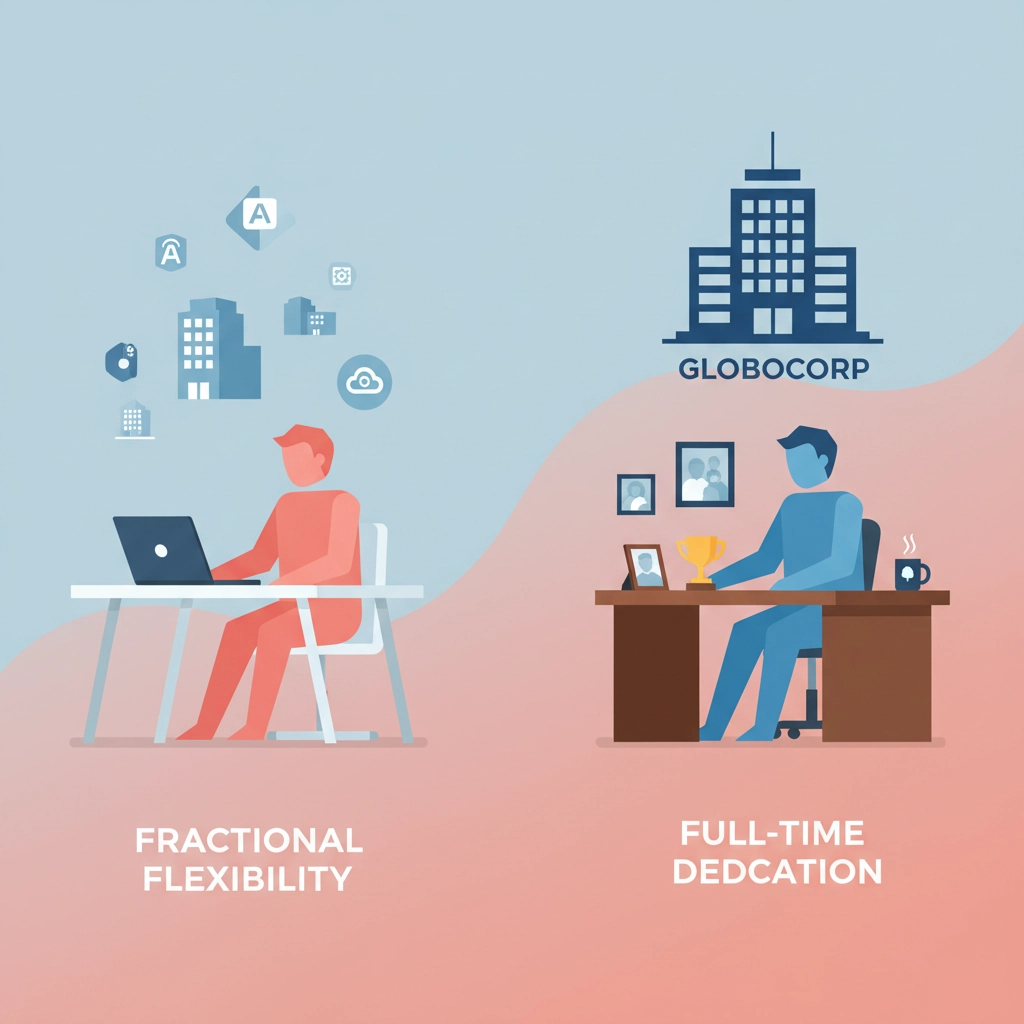When your business is scaling up, one of the biggest decisions you’ll face is how to bring in senior leadership. Do you hire a full-time director who’ll be with you through thick and thin? Or do you bring in a fractional director who can deliver expert guidance without the hefty price tag?
The answer isn’t black and white. It depends on where your business is now, where you’re headed, and what you can realistically afford. Let’s break down both options so you can make the right call for your growing company.
What Are Fractional Directors?
Fractional directors are senior executives who work with multiple companies on a part-time basis. Think of them as your C-suite on tap – you get access to top-tier expertise without the full-time commitment or costs.
These aren’t consultants who pop in for a quick review and disappear. Fractional directors integrate with your leadership team, attend board meetings, and make strategic decisions alongside your permanent staff. The key difference? They’re typically working 1-3 days per week for your business while serving other clients too.

What fractional directors bring to the table:
- Immediate expertise: No learning curve – they’ve likely tackled your exact challenges before
- Fresh perspective: They see patterns and solutions from working across different industries
- Strategic focus: They concentrate on high-level strategy rather than getting bogged down in day-to-day operations
- Network access: Their connections can open doors you didn’t even know existed
The fractional model works particularly well for roles like CFO, CMO, or COO where you need strategic oversight but not necessarily someone managing teams full-time.
What About Full-Time Hires?
Full-time directors are permanent employees who dedicate their entire working week to your business. They’re embedded in your culture, know every team member by name, and are invested in your long-term success.
The benefits of full-time leadership:
- Complete dedication: Your challenges are their only focus
- Cultural integration: They understand your company’s DNA and can shape it as you grow
- Team development: They’re there to mentor your staff and build internal capabilities
- Operational oversight: They can handle both strategy and day-to-day management
Full-time hires make sense when you need someone who can wear multiple hats and dive deep into operational details.
The Cost Reality Check
Let’s talk numbers, because this often comes down to budget.
A full-time director typically costs between £80,000-£150,000+ in salary alone. Add in National Insurance, pension contributions, benefits, office space, and equipment, and you’re looking at £100,000-£200,000+ total cost of employment annually.
Compare this to a fractional director working two days per week at £800-£1,200 per day. That’s roughly £80,000-£125,000 annually – but you’re getting someone with 15-20 years of senior experience who might otherwise be out of your budget range.

The maths gets even more interesting when you consider that many businesses don’t actually need 40 hours of C-level input per week, especially in the early growth phases. You might get better value from 16 hours of high-level strategic work than 40 hours of mixed strategic and operational tasks.
When Should You Choose a Fractional Director?
Fractional directors are ideal in several scenarios:
You’re in a growth transition phase: Maybe you’ve just secured funding, entered a new market, or are preparing for acquisition. These situations require intensive strategic input but aren’t necessarily permanent states.
You need specific expertise temporarily: Launching in Europe? Need to implement new financial systems? Going through a digital transformation? A fractional director with relevant experience can guide you through these projects.
You’re not ready for full-time senior costs: Growing businesses often struggle with leadership costs. A fractional approach lets you access senior talent while preserving cash flow.
Your business is project-driven: If your growth comes in phases or seasons, fractional leadership can scale with your needs.
When Does a Full-Time Hire Make More Sense?
Full-time directors become essential when:
You need comprehensive operational management: If someone needs to manage large teams, oversee multiple departments, or handle complex day-to-day operations, you need full-time attention.
Your business requires cultural development: Building company culture and developing internal talent takes consistent presence and relationship-building.
You have steady, predictable leadership needs: Once your business reaches a certain scale, you’ll have enough strategic and operational work to justify a full-time role.
Integration is critical: Some roles, particularly in heavily regulated industries or complex operational environments, require deep integration that’s difficult to achieve part-time.

The Hybrid Approach
Many successful businesses don’t see this as an either/or decision. They start with fractional leadership to establish systems, strategies, and processes, then transition to full-time roles as operational demands increase.
For example, you might bring in a fractional CFO to establish financial controls and reporting systems. Once those are in place and your business has grown enough to justify the full-time cost, you can hire a permanent CFO who builds on those foundations.
This approach gives you the best of both worlds: immediate expertise when you need it most, followed by dedicated leadership as your business matures.
Making the Right Choice for Your Business
Consider these questions:
- Do you need strategy or operations? If it’s primarily strategic guidance, fractional might be sufficient. If you need someone managing teams and processes daily, go full-time.
- What’s your growth timeline? Rapid growth phases often benefit from fractional expertise, while steady-state businesses usually need full-time leadership.
- Can you afford to wait? Full-time hiring takes longer. If you need leadership expertise quickly, fractional directors can start contributing immediately.
- What’s your risk tolerance? Full-time hires are a bigger financial commitment with higher costs if things don’t work out.
The Bottom Line
There’s no universal right answer, but there’s definitely a right answer for your business right now. If you’re struggling with strategic growth decisions, consider whether you need the deep operational integration of a full-time hire or the strategic expertise and flexibility of a fractional director.
The key is being honest about where your business is today, what you can afford, and what type of leadership will drive the most value. Many businesses find that fractional leadership provides exactly the strategic boost they need to reach the next level – at which point they can reassess whether it’s time to bring that expertise in-house.
Whatever you choose, make sure it aligns with your growth plans and budget realities. The right leadership structure should accelerate your growth, not constrain it.


